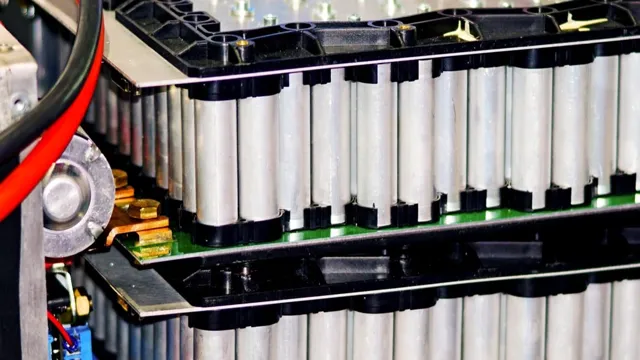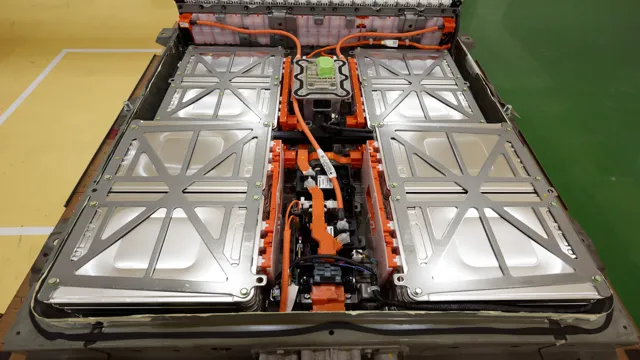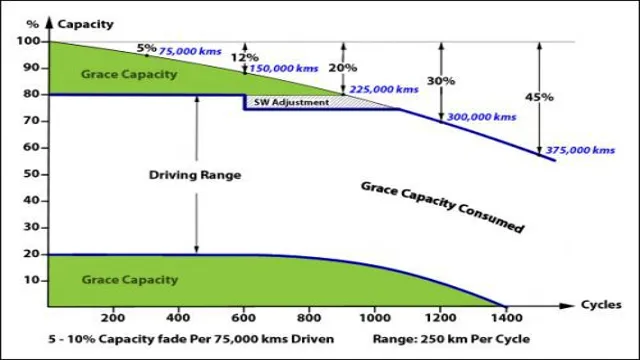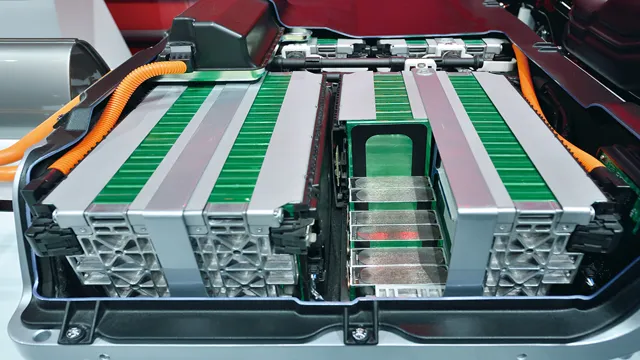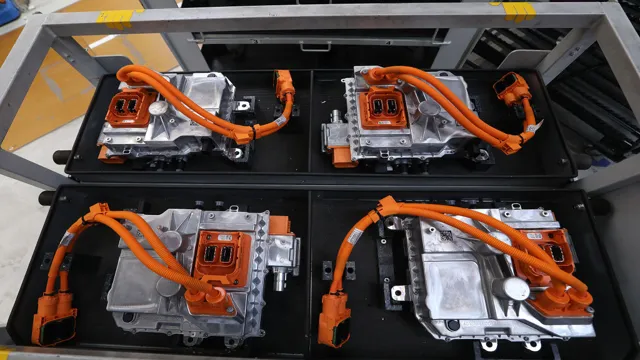Unmasking The Truth: How Electric Car Batteries Contribute To Pollution
As more people look for alternative ways to curb pollution and reduce their carbon footprint, electric cars have gained a lot of popularity. However, some still wonder whether these cars’ batteries could potentially cause pollution. After all, electric car batteries are huge, expensive, and require a lot of energy to manufacture.
But do they pose a significant environmental impact that outweighs the benefits of electric cars? In this blog post, we’ll take a closer look at whether electric car batteries cause pollution, and if so, to what extent.
Environmental Impact of Car Batteries
Electric car batteries have been hailed as a cleaner and more sustainable alternative to traditional fossil fuel engines. While they offer many benefits, they also have their downsides, particularly when it comes to their environmental impact. Contrary to popular belief, electric car batteries can cause pollution, especially during the manufacturing process.
The production and disposal of lithium-ion batteries require large amounts of energy and resources, and they emit a significant amount of greenhouse gases. Moreover, the extraction of materials such as lithium, cobalt, and nickel used in batteries can lead to environmental damage and human rights abuses. However, many automakers and battery manufacturers are taking steps to minimize these impacts, such as sourcing ethical, sustainable materials and implementing closed-loop recycling programs.
It’s essential to consider the environmental impact of electric car batteries alongside their many benefits and strive towards a more sustainable and cleaner future for all.
The Manufacturing Process
Car batteries are a crucial component of our vehicles that often go unnoticed. However, the manufacturing process of these batteries can have quite a significant impact on the environment. During the production of car batteries, a vast amount of energy is consumed, and hazardous materials are utilized.
The production of these materials is energy-intensive, which leads to greenhouse gas emissions and contributes to climate change. Moreover, the extraction of these materials can be damaging to the environment, negatively affecting local ecosystems and freshwater resources. The disposal of car batteries is also an issue since they contain toxic chemicals that can contaminate soil and groundwater, ultimately leading to severe harm to human health and the environment.
Therefore, it is essential to implement sustainability measures in the manufacturing, use, and disposal of car batteries to lessen their impact on the environment.
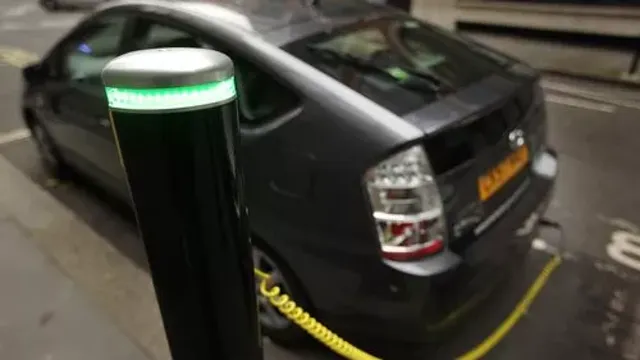
Disposal of Old Batteries
Car batteries have a significant impact on the environment due to the hazardous chemicals they contain. As these batteries age or wear out, they become more damaging to the environment, contaminating the soil, groundwater, and air. They often end up in landfills, which is a major concern because they contain toxic metals such as lead and cadmium.
As a responsible citizen, it is our duty to dispose of them properly, avoiding any harm to the environment. Fortunately, many recycling centers and drop-off locations accept old batteries, and they recycle the materials, such as lead, acid, and plastic, for other uses. When we dispose of car batteries inefficiently, we put our environment at risk.
Not only do we contribute to land pollution, but we also expose ourselves and others to harmful toxins. The good news is that proper disposal of old batteries is not difficult. We can take them to a recycling center or an authorized drop-off location and know that they will be processed safely without any environmental damage.
By adopting these simple practices, we can ensure that we are doing our part to safeguard our planet for future generations.
Fossil Fuels vs Renewables
Many people believe that the rise of electric cars will lead to a decrease in pollution, but the truth is more complex. While electric cars themselves don’t emit pollution, the production of their batteries does contribute to environmental damage. The mining of metals like lithium, cobalt, and nickel for these batteries can cause destruction of habitats and water pollution.
Additionally, the production process of these batteries emits greenhouse gases, contributing to climate change. However, it’s important to note that the emissions from the production of electric car batteries are still significantly less than the emissions caused by the production and use of fossil fuels in traditional cars. So while electric car batteries do cause some pollution, they still represent a more environmentally friendly choice overall.
Electricity Generation and Emissions
When it comes to generating electricity, there are two primary approaches that we can use: fossil fuels and renewables. Fossil fuels include coal, oil, and natural gas, while renewables refer to wind, solar, and hydro power. While both methods have their advantages and disadvantages, the main factor that sets them apart is their carbon emissions.
Fossil fuels contribute to climate change by releasing large amounts of carbon dioxide and other harmful gases into the atmosphere, whereas renewables are virtually emissions-free. This makes renewables a much more sustainable and environmentally responsible choice. Additionally, fossil fuels are a finite resource, whereas renewables are renewable, meaning that they offer long-term benefits for the environment and the economy.
Although the initial investment in renewable energy may be higher, the long-term benefits make it well worth it. Ultimately, the choice between fossil fuels and renewables is one that we must make with our future in mind, and the more we can invest in renewable energy, the better off we will be as a society.
Transitioning to Renewable Energy
Transitioning to renewable energy is becoming increasingly popular as the environmental impact of fossil fuels becomes more evident. While fossil fuels have been the dominant source of energy for many years, renewable energy sources like solar, wind, and hydro are emerging as better alternatives. One major advantage of renewables is their sustainability compared to fossil fuels, which are finite and deplete over time.
In addition, renewable energy sources emit lower levels of greenhouse gases, which helps to slow down climate change. It’s true that renewable energy has its challenges, such as intermittency and storage, but many countries are investing in new technologies and infrastructure to overcome these obstacles and make the shift towards a cleaner future. Ultimately, transitioning to renewable energy is not only vital for the planet but also provides economic opportunities and job creation in the renewable energy industry.
Lifecycle Analysis of Electric Cars
Electric cars have become increasingly popular in recent years as people shift towards more sustainable modes of transportation. However, there has been much debate surrounding which energy source is used to power these vehicles. Fossil fuels have been the traditional source of energy for most vehicles, but they contribute to greenhouse gas emissions and climate change.
On the other hand, renewable energy sources like wind and solar power are cleaner and more sustainable. A lifecycle analysis of electric cars shows that their environmental impact varies depending on the source of the electricity used to charge their batteries. The use of renewable energy sources is key for electric cars to be truly sustainable and reduce their carbon footprint.
It’s important to consider the full lifecycle impact of these vehicles, from production to disposal, to truly assess their environmental impact. Investing in renewable energy sources is crucial in making electric cars a viable and sustainable option for the future.
Reducing Battery Pollution
Electric car batteries play a significant role in reducing our carbon footprint, but they also cause pollution. The mining and production of battery materials, such as lithium and cobalt, can lead to environmental degradation and exploitation of labor. Additionally, when batteries are disposed of, they can release toxic chemicals into the environment.
However, efforts are currently underway to reduce battery pollution. Companies are working to improve battery recycling facilities, recover valuable materials from end-of-life batteries, and minimize the use of harmful substances in battery production. In the future, advancements in battery technology may also reduce the need for these materials altogether.
While electric car batteries may currently cause pollution, the industry is taking proactive steps to minimize and eventually eliminate this issue, ensuring a cleaner and more sustainable future.
Battery Recycling and Reuse
Battery recycling and reuse are vital in reducing battery pollution and promoting environmental sustainability. Discarding batteries in the trash has detrimental effects on the environment because batteries contain toxic chemicals such as lead, acid, mercury, and cadmium that are highly detrimental to human health and the ecosystem. Recycling batteries reduces pollution and conserves natural resources since the recyclable materials in batteries can be repurposed into new products.
Besides, reusing old batteries prolongs their lifespan, reduces waste, and saves resources. Therefore, individuals and organizations should embrace sustainable practices like recycling and reusing batteries to reduce pollution and promote a healthier and safer environment.
Innovations in Battery Technology
As the demand for electric vehicles rises, battery technology has become integral in shaping the future of transportation. However, this rise in battery production has also led to an increase in battery pollution. As a result, researchers and engineers are looking for ways to reduce the environmental impact of batteries.
One solution being developed is the use of recycled materials, specifically those found in old batteries. By extracting and repurposing materials such as lithium and cobalt from old batteries, researchers can reduce the need for mining raw materials and decrease the amount of waste produced. This approach not only reduces pollution but also creates a sustainable, circular economy for battery production.
By embracing these innovative solutions, we can move towards a cleaner, more environmentally friendly future.
Conclusion
While it may seem counterintuitive, the rise of electric cars has inadvertently led to the production of more pollution. It’s not that the batteries themselves are inherently polluting, but rather the process of manufacturing them and sourcing the materials needed to make them can have negative environmental effects. This is not to say that we should give up on electric cars altogether, but rather that we need to think more holistically about the entire life cycle of these vehicles, from production to disposal, so we can work towards a truly sustainable future.
“
FAQs
How do electric car batteries cause pollution?
The production and disposal of electric car batteries can release harmful pollutants into the environment, such as heavy metals and toxic chemicals.
Can electric car batteries be recycled?
Yes, electric car batteries can be recycled to recover valuable materials and reduce waste. However, the recycling process itself can also generate pollution if not done properly.
Are there alternatives to electric car batteries that are more environmentally friendly?
Yes, some researchers are exploring alternative technologies for electric cars, such as hydrogen fuel cells, that have a smaller environmental footprint.
What steps are being taken to reduce the environmental impact of electric car batteries?
Some companies are implementing sustainable practices in the production and disposal of electric car batteries, such as using renewable energy sources and establishing recycling programs. Governments are also considering policies to incentivize sustainable battery production and disposal.
